Two-plus years later, UMMC remains leader in COVID-19 response
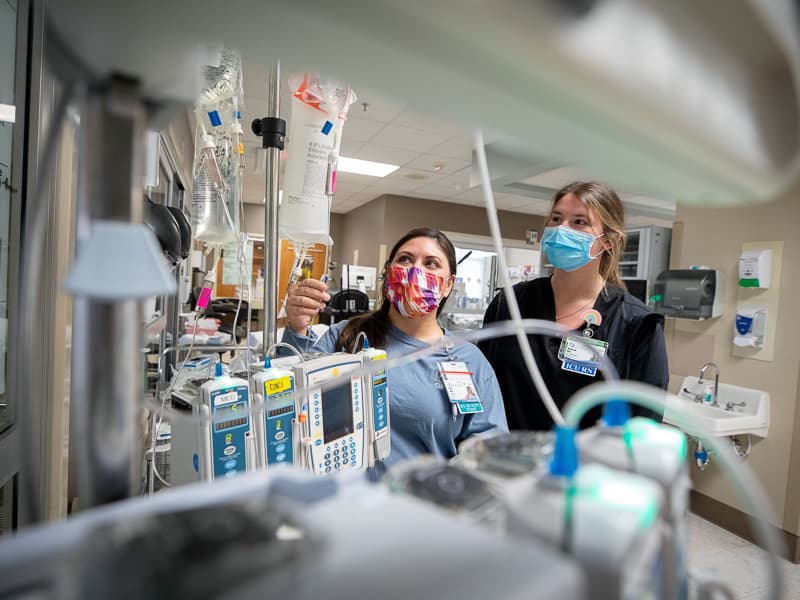
When the first COVID-19 patient arrived in March 2020 at the University of Mississippi Medical Center, the state’s only safety net hospital was already honing its focus on the global public health emergency.
That’s the daily mindset of Mississippi’s only academic medical center and the leader in providing specialty services to care for the sickest of the sick and traumatically injured. Over the next two years, UMMC has brought all of its resources to bear on a disaster that so far in Mississippi has claimed 12,330 lives and sickened 793,390, both conservative numbers, most recent statistics from the Mississippi State Department of Health show.
That full-scale operation continues today. The front-line heroes of the Medical Center are in their third year of courageously giving care to highly infectious patients, holding their hands, even as some take their last breath.
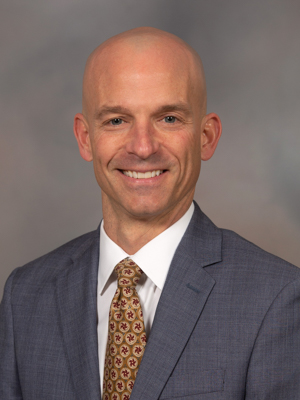
“I’m proud of our workforce and their commitment and willingness to care for patients, even amidst their own anxieties and fears,” said Dr. Alan Jones, associate vice chancellor for clinical affairs and a veteran emergency room physician.
“We should be proud as an institution for leading the way in the state’s clinical response, and working with the Mississippi State Department of Health to get therapies out and take care of large volumes of people – to find a way to make what seemed impossible, possible.”
COVID-19 continues to be unpredictable, with one patient having no symptoms and the next gravely ill in UMMC’s intensive care unit. The Medical Center’s leadership has made many decisions since early 2020 that were purposeful, collaborative and often swift to protect the health of Mississippians and fulfill UMMC’s obligation to use its resources to be innovative in times of disaster and great need.
Among the earliest milestones that defined UMMC’s pandemic leadership role:
- In early January 2020, the Medical Center’s infectious medicine prevention and control team led by Dr. Jason Parham and Dr. Bhagyashri Navalkele formulated policies and procedures for screening patients and visitors for the virus. They educated employees and scores of Mississippians on the ever-changing science of COVID-19.
- A leadership team guided the Medical Center’s robust response: Dr. LouAnn Woodward, vice chancellor for health affairs and dean of the School of Medicine, as incident commander; Jones, clinical response leader; and Chief Administrative Officer Dr. Jonathan Wilson, incident manager.
- UMMC’s Center for Telehealth vaulted to the front lines of the pandemic response, ramping up virtual visits to make care safer and more accessible. From Feb. 20-March 20, 2020, there was a 286 percent increase in telehealth visits and an increase in telehealth users by 5,704 percent.
- UMMC partnered with the Mississippi State Department of Health to provide widespread collection of swab samples for COVID-19 testing beginning March 23, 2020, at the Mississippi State Fairgrounds. The initiative soon spread statewide, with tens of thousands tested at drive-through stations in communities large and tiny. The online tool Mississippians used to schedule their testing appointment was developed by UMMC Department of Information Systems and that application is still in use today.
- Medical Center scientists and laboratory team members provided a huge boost to Mississippi’s ability to manage the pandemic when they developed an in-house COVID-19 test in just two weeks, running the first samples March 26, 2020. To date, they’ve tested 425,000 samples.
- A Medical Center anesthesiologist in April 2020 created a ventilator, using a garden hose and other items found at hardware stores or online, for use should UMMC’s supply fall short. The ventilator received emergency-use authorization by the Food and Drug Administration but was never put into use.
- UMMC increased access to care by creating a mobile field clinic in a campus parking garage for patients with respiratory issues who weren’t ill enough for a trip to the emergency room.
- The Medical Center moved swiftly to provide COVID-19 therapies following their emergency FDA approval, including the antiviral drug Remdesivir. UMMC set up a parking garage clinic exclusively for monoclonal antibody treatment in summer 2021, offering hope to patients with moderate to severe cases of COVID-19.
- Amidst record staffing shortages, UMMC leaders worked with the Department of Defense and the nonprofit Samaritan’s Purse in summer 2021 to erect fully functional hospital tents in campus parking garages, easing the crushing numbers of COVID-19 patients in the Emergency Department and the ICUs.
“We continue to lead the state in the amount of ICU services,” Jones said. “We are obviously out front and vocal on getting people vaccinated, and having outreach into communities with lower vaccination rates.”
Mississippi MED-COM, a part of UMMC’s Mississippi Center for Emergency Services, has facilitated the transfer of hundreds of seriously ill COVID-19 patients from hospitals around the state to the Medical Center for a higher level of care and led coordination of emergency medical transport and patient transfers statewide.

“Our call volume increased by about 1,500 calls a month,” said Stephen Houck, clinical director of MED-COM, Mississippi’s emergency medical and disaster response clearinghouse staffed 24/7 by paramedics and emergency medical technicians.
“I look back at how flexible and nimble we had to be. It’s good to see that goes way beyond a four-day disaster,” Houck said. “This is probably the longest disaster we’ve ever had to deal with.”
Today, the number of COVID-19 inpatients at the Medical Center is at one of the lowest marks since the early months of the pandemic. On March 21, 2022 that number was 32 patients who were either confirmed positive (3), being investigated for possible COVID-19 (5), or convalescing but no longer contagious (24). Of the 32, six were children.
Registered intensive care nurse Mellisa Collins is relieved that the numbers are better. She remembers her worst moments over the last two years – and the joy brought through healing.
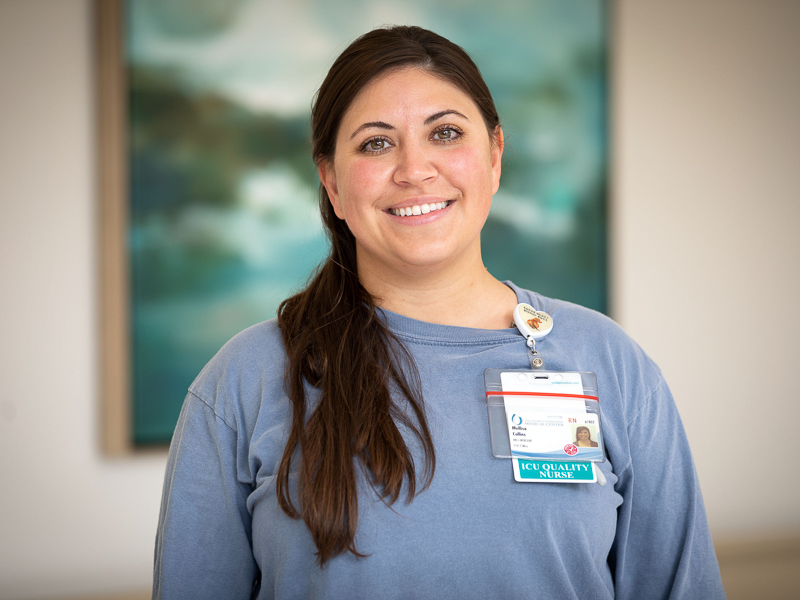
“Five members of the Choctaw community died in one day. Bringing in family to see them for the last time ... It was very emotional,” said Collins, in her 11th year in the Medical ICU.
But another COVID-19 patient, a member of the military, spent more than four months in the ICU. “There were several times when our providers told his wife she needed to brace for the worst,” Collins said. “He made it.”
Days after UMMC saw its first COVID-19 patient, the Medical Center’s response evolved into a new stage: Initiating or taking part in clinical trials and studies on how to treat the virus, adding significantly to the growing body of knowledge nationally and internationally.
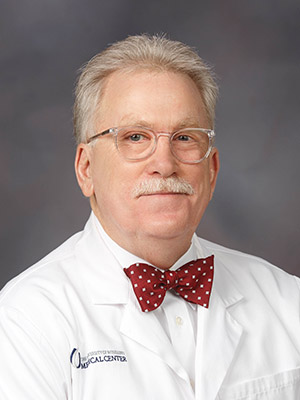
To date, that’s 38 clinical trials or studies. “By getting involved early on, we established a place to gather objective data to benefit our patients, if not in that moment, in the future,” said Dr. Gailen Marshall, the R. Faser Triplett Chair of Allergy and Immunology.
“Before the pandemic, we had a more modest reputation for our clinical trials. That expanded almost exponentially during the first year of the COVID crisis,” Marshall said. “We had to start turning down studies, and we continue to turn down some new studies because of limited resources. We’re at near capacity for doing clinical trials, and it’s never been that way in the 18 years I’ve been on campus.”
Marshall is UMMC’s lead investigator for a massive nationwide effort to understand who is most likely to develop long COVID and how to treat and prevent it. It’s called RECOVER, or Researching COVID to Enhance Recovery, and includes patients with persistent symptoms 30 or more days after diagnosis.
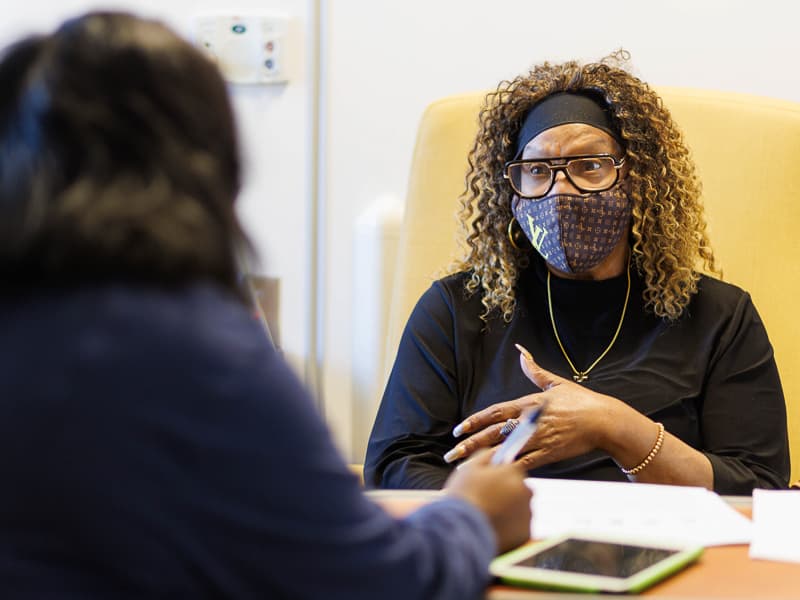
“You want to know why,” said Gloria Banks of Jackson, a study participant and January 2021 survivor of COVID-19 severe enough to require hospitalization at UMMC. “You just wonder how some people are affected so much worse than others. I didn’t bounce back.”
The nursing staff showed its resilience by pushing through a year and a half of exhaustion and mental strife, of suffering and death and their own sickness from COVID-19, of persecution by those who denied the threat and shunned the vaccine, and for some, doubts about whether to stay in their profession.
“Our employees have pulled through this as a team. They have a higher sense of duty to the state and the patients we serve,” Jones said.
Even though nurses around her retired or left for other jobs, Collins stayed. One reason is hard-wired into her very being: “I know that UMMC takes care of the sickest of the sick,” she said.
“At UMMC, when we have issues arise, people are willing to listen to our creative ideas. My opinions are heard, and I have the ability to change patient care. That’s why I’m here.”
The Medical Center’s nurses, Woodward said, have been through a sustained traumatic event.
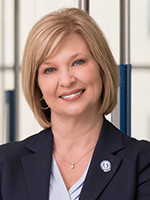
“It’s good to have the feeling that things are getting back to normal, and to have days where things are going well. But it will take much more time before we recover and catch up with the staffing we need,” Woodward said. “We have a long road ahead of us.”
But along the way, Houck said, “we’ve learned plenty about COVID.”
“There’s a sense that there will be additional peaks of the virus that come our way, and it’s likely to continue for some time. We just have to take what we’ve learned through this and try to apply those principals,” Jones said.
“We have to understand that while being in the middle of a peak is difficult, you will get through it and come out on the other side.”


